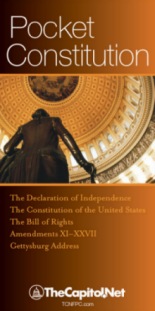- How Legislation Is Brought to the House Floor: A Snapshot of Parliamentary Practice in the 112th Congress (2011-2012), CRS Report R43039, April 15, 2013 (14-page PDF
 )
) - The STOCK Act, Insider Trading, and Public Financial Reporting by Federal Officials, CRS Report R42495, April 12, 2013 (13-page PDF
 )
) - Trends in Discretionary Spending, CRS Report RL34424, April 15, 2013 (38-page PDF
 )
) - Secret Sessions of the House and Senate: Authority, Confidentiality, and Frequency, CRS Report R42106, March 15, 2013 (11-page PDF
 )
)
Facial Recognition Technology and Law Enforcement: Select Constitutional Considerations (CRS R46541)
Facial recognition technology (FRT) is a biometric technology that compares two or more images of faces to determine whether they represent the same individual. Automated FRT is increasingly used by law enforcement to help identify criminal suspects and other persons of interest. Law enforcement may use FRT and associated image databases to compare and match … Read more


